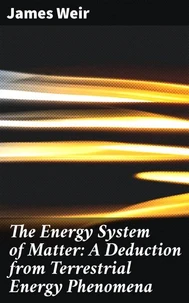The Energy System of Matter: A Deduction from Terrestrial Energy Phenomena
Par :Formats :
Disponible dans votre compte client Decitre ou Furet du Nord dès validation de votre commande. Le format ePub est :
- Compatible avec une lecture sur My Vivlio (smartphone, tablette, ordinateur)
- Compatible avec une lecture sur liseuses Vivlio
- Pour les liseuses autres que Vivlio, vous devez utiliser le logiciel Adobe Digital Edition. Non compatible avec la lecture sur les liseuses Kindle, Remarkable et Sony
 , qui est-ce ?
, qui est-ce ?Notre partenaire de plateforme de lecture numérique où vous retrouverez l'ensemble de vos ebooks gratuitement
Pour en savoir plus sur nos ebooks, consultez notre aide en ligne ici
- Nombre de pages131
- FormatePub
- ISBN859-65--4731854-5
- EAN8596547318545
- Date de parution15/09/2022
- Protection num.Digital Watermarking
- Taille462 Ko
- Infos supplémentairesepub
- ÉditeurDIGICAT
Résumé
In "The Energy System of Matter: A Deduction from Terrestrial Energy Phenomena, " James Weir explores the intricate interplay between energy and matter through a vivid lens of natural phenomena. Written during a period of burgeoning scientific inquiry, Weir employs a methodical and analytical literary style, captivating readers with his rigorous approach to observation and deduction. The book not only synthesizes contemporary theories in physics and chemistry but also challenges prevailing notions of energy, arguing for a fundamental interconnection that underpins all matter-an assertion that anticipated later developments in energy systems.
James Weir, an influential figure in scientific circles from 1883 to 1912, dedicated his career to the exploration of the natural world's energies. His background in both science and philosophy provided him with a unique perspective that fueled his fascination with energy phenomena. Weir's work reflects a time of transformation in the understanding of energy, influenced by predecessors like Maxwell and Helmholtz, and his approach offers a critical synthesis of varying scientific perspectives.
This book is essential for anyone interested in the evolution of energy theory and its implications for matter. Weir's thoughtful insights and analyses not only enrich the field of physical sciences but also invite readers to reflect on the broader philosophical questions regarding the nature of existence.
James Weir, an influential figure in scientific circles from 1883 to 1912, dedicated his career to the exploration of the natural world's energies. His background in both science and philosophy provided him with a unique perspective that fueled his fascination with energy phenomena. Weir's work reflects a time of transformation in the understanding of energy, influenced by predecessors like Maxwell and Helmholtz, and his approach offers a critical synthesis of varying scientific perspectives.
This book is essential for anyone interested in the evolution of energy theory and its implications for matter. Weir's thoughtful insights and analyses not only enrich the field of physical sciences but also invite readers to reflect on the broader philosophical questions regarding the nature of existence.
In "The Energy System of Matter: A Deduction from Terrestrial Energy Phenomena, " James Weir explores the intricate interplay between energy and matter through a vivid lens of natural phenomena. Written during a period of burgeoning scientific inquiry, Weir employs a methodical and analytical literary style, captivating readers with his rigorous approach to observation and deduction. The book not only synthesizes contemporary theories in physics and chemistry but also challenges prevailing notions of energy, arguing for a fundamental interconnection that underpins all matter-an assertion that anticipated later developments in energy systems.
James Weir, an influential figure in scientific circles from 1883 to 1912, dedicated his career to the exploration of the natural world's energies. His background in both science and philosophy provided him with a unique perspective that fueled his fascination with energy phenomena. Weir's work reflects a time of transformation in the understanding of energy, influenced by predecessors like Maxwell and Helmholtz, and his approach offers a critical synthesis of varying scientific perspectives.
This book is essential for anyone interested in the evolution of energy theory and its implications for matter. Weir's thoughtful insights and analyses not only enrich the field of physical sciences but also invite readers to reflect on the broader philosophical questions regarding the nature of existence.
James Weir, an influential figure in scientific circles from 1883 to 1912, dedicated his career to the exploration of the natural world's energies. His background in both science and philosophy provided him with a unique perspective that fueled his fascination with energy phenomena. Weir's work reflects a time of transformation in the understanding of energy, influenced by predecessors like Maxwell and Helmholtz, and his approach offers a critical synthesis of varying scientific perspectives.
This book is essential for anyone interested in the evolution of energy theory and its implications for matter. Weir's thoughtful insights and analyses not only enrich the field of physical sciences but also invite readers to reflect on the broader philosophical questions regarding the nature of existence.


